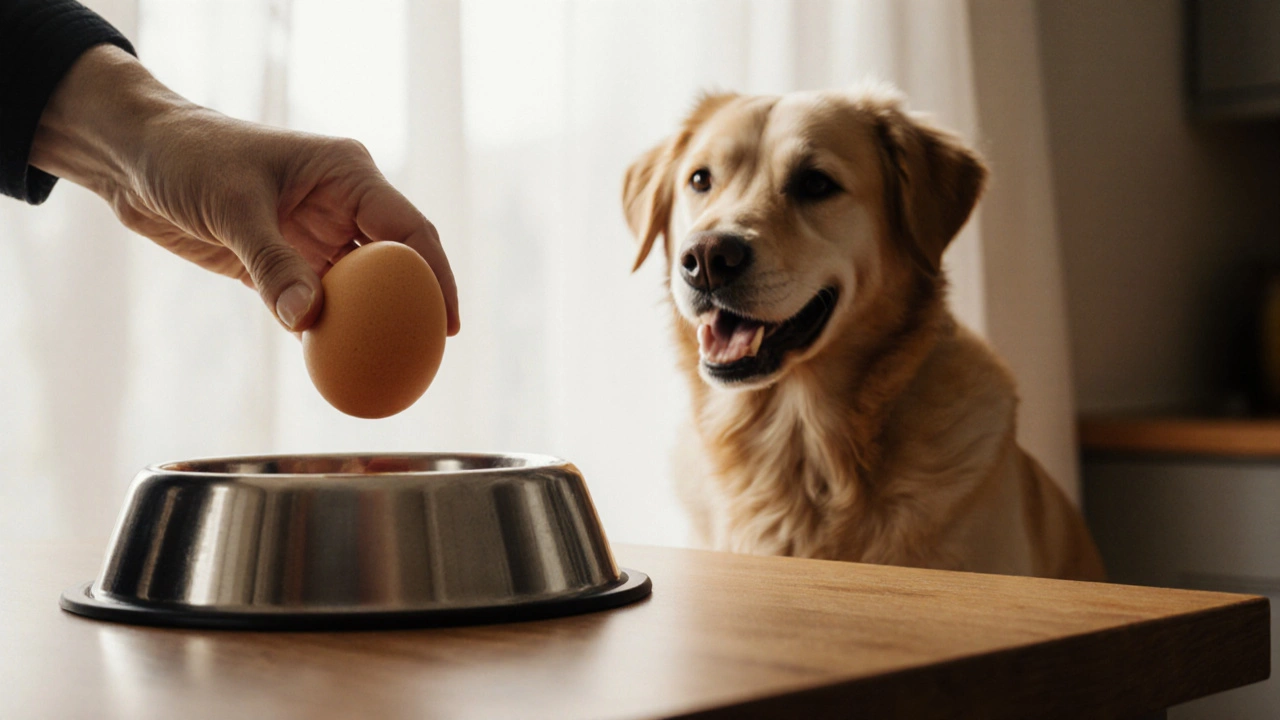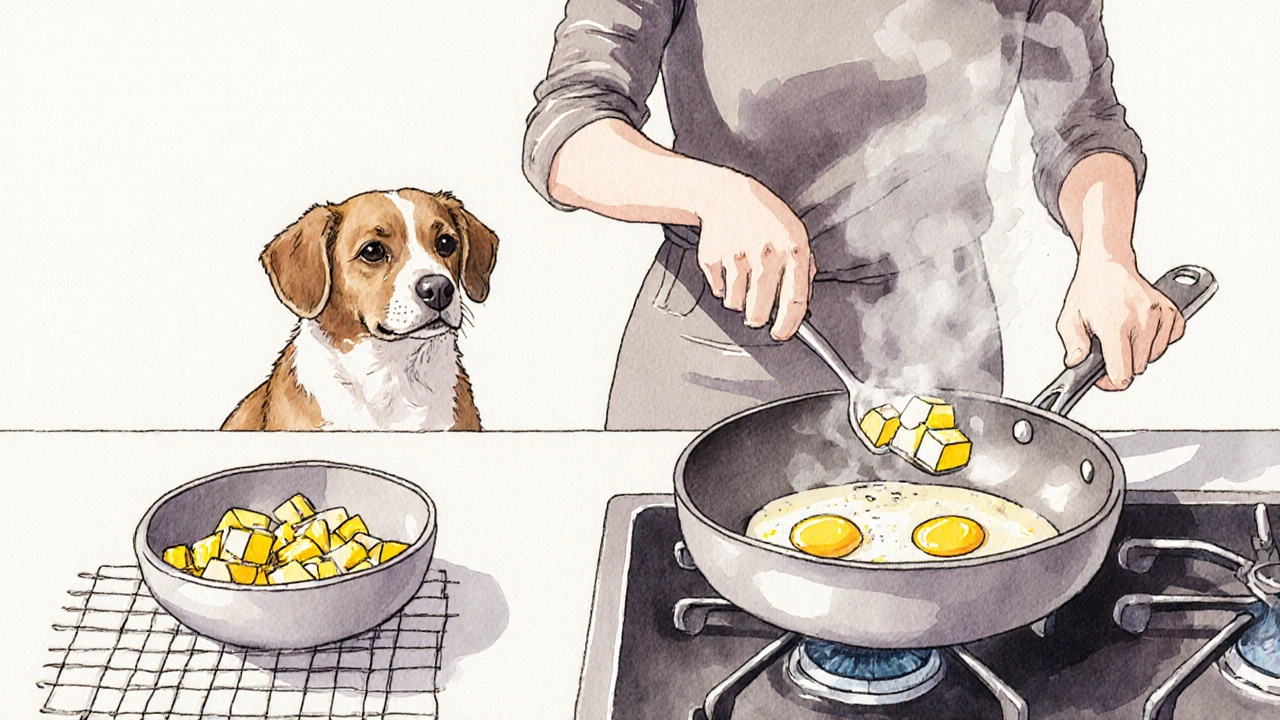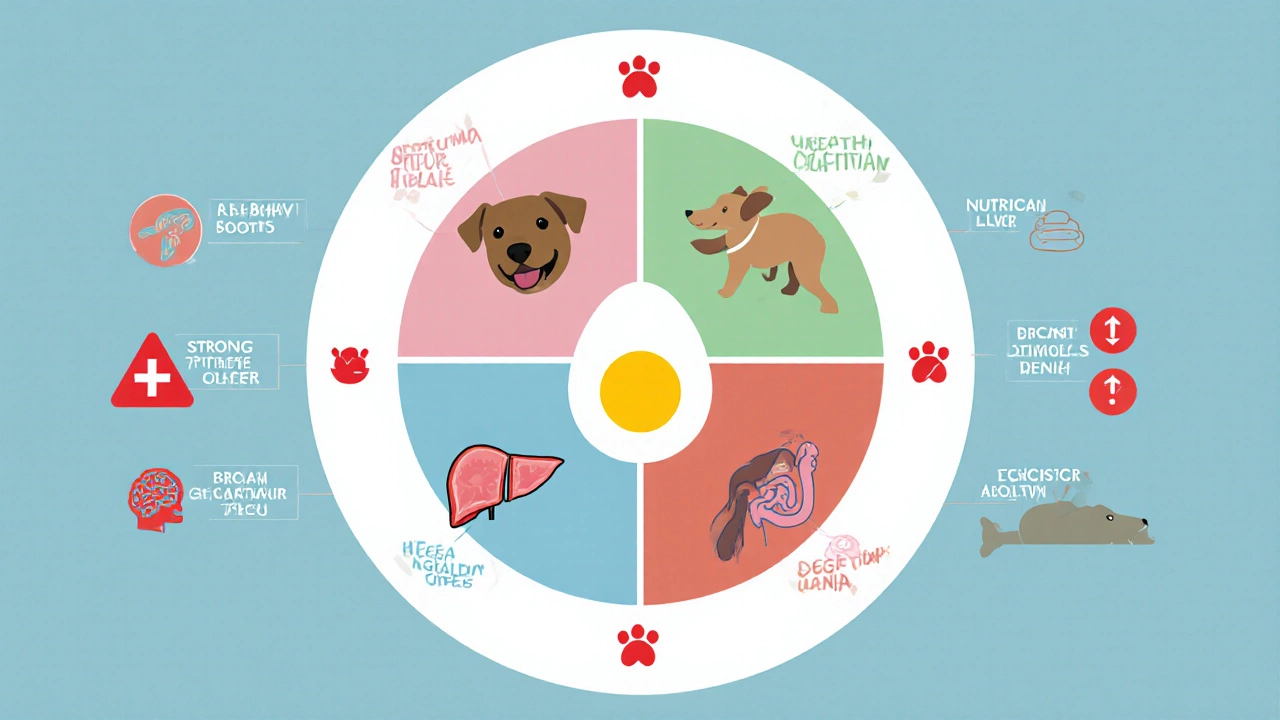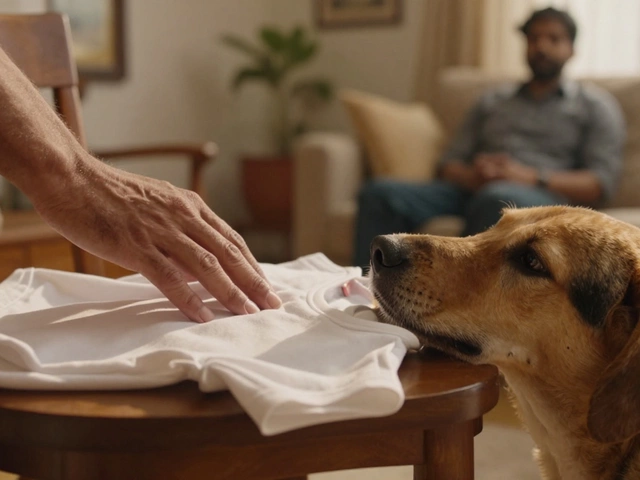
Dog Egg Portion Calculator
Egg Feeding Guide
Based on veterinary recommendations for safe egg consumption.
Ever caught your dog staring at your breakfast with those big, hopeful eyes? You might be wondering-can I safely share that scrambled egg with them? It’s a simple question, but the answer isn’t just yes or no. Feeding eggs to dogs comes with real benefits, real risks, and a lot of outdated myths. Let’s cut through the noise and give you the straight facts based on what veterinarians and pet nutritionists actually recommend today.
Why Eggs Are a Nutritional Powerhouse for Dogs
Eggs aren’t just for humans. For dogs, they’re a complete protein source packed with essential amino acids your pup needs to build muscle, repair tissue, and keep their coat shiny. A single large egg contains about 6 grams of high-quality protein and only 70 calories-making it a lean, nutrient-dense snack.
They’re also loaded with vitamins your dog can’t make on their own: Vitamin A for vision and skin, Vitamin B12 for nerve function, riboflavin for energy, and selenium-an antioxidant that helps protect cells. The yolk? That’s where the good stuff lives. It’s rich in choline, which supports brain health and liver function. In fact, choline deficiency has been linked to liver disease in dogs, and eggs are one of the best natural sources.
Studies from the University of Illinois and the American College of Veterinary Nutrition show that dogs fed diets with egg protein had better digestibility and higher plasma amino acid levels compared to those on plant-based proteins alone. That’s why many commercial dog foods list eggs as a top ingredient.
Raw vs Cooked Eggs: What’s Safe?
This is where things get tricky. You’ve probably heard conflicting advice: some say raw eggs are better, others warn they’re dangerous. Here’s the truth: cooked eggs are the safer, smarter choice.
Raw egg whites contain a protein called avidin, which can bind to biotin (a B vitamin) and block its absorption. In large amounts over time, this could lead to a biotin deficiency-dry skin, hair loss, even neurological issues. But here’s the catch: you’d need to feed your dog dozens of raw eggs weekly for this to become a real problem. Still, why risk it?
Heat from cooking destroys avidin, so scrambled, boiled, or poached eggs eliminate that risk entirely. Plus, cooking reduces the chance of salmonella or E. coli contamination. While healthy adult dogs have strong stomach acids that can handle some bacteria, puppies, seniors, or dogs with compromised immune systems are more vulnerable.
Bottom line: cook them. Plain. No butter, no oil, no salt, no garlic, no onions. Just eggs. If your dog loves the taste of scrambled eggs with a tiny splash of water (not milk), go for it. But skip the breakfast sausage.
How Many Eggs Can a Dog Eat?
More isn’t better. Even healthy foods can cause problems when overdone.
For small dogs (under 20 lbs): one egg per week is plenty. Medium dogs (20-50 lbs): two eggs per week. Large dogs (50+ lbs): up to three eggs per week.
Why the limits? Eggs are high in fat and cholesterol. While dogs handle dietary cholesterol better than humans, too much fat can trigger pancreatitis-especially in breeds like Miniature Schnauzers, Cocker Spaniels, or Yorkshire Terriers. Also, eggs are calorie-dense. One egg equals about 70 calories. For a 20-pound dog, that’s nearly 10% of their daily needs. Too many eggs and you’re replacing balanced kibble with treats, which throws off their nutrient balance.
Start slow. If your dog has never had eggs before, give them a quarter of a cooked egg and watch for 24 hours. Look for signs of upset stomach: vomiting, diarrhea, or gas. If they’re fine, gradually increase the amount over the next few weeks.

When Eggs Are a Bad Idea
Not every dog should eat eggs. Here’s when to skip them:
- History of pancreatitis - High-fat foods can trigger flare-ups.
- Food allergies - Egg allergies are rare but real. Symptoms include itchy skin, ear infections, or gastrointestinal upset. If you suspect an allergy, stop feeding eggs and talk to your vet about an elimination diet.
- Obesity - Eggs add calories. If your dog is already overweight, swap eggs for low-calorie veggies like green beans or carrots.
- Chronic kidney disease - High protein diets can strain kidneys. Your vet may recommend limiting protein, which means skipping eggs.
If your dog has any ongoing health issue, always check with your vet before adding new foods-even ones considered “safe.”
Eggshells: Good or Bad?
Some dog owners grind up eggshells to add calcium to their dog’s diet. It’s a practice that sounds smart, but it’s often unnecessary and potentially risky.
Most commercial dog foods already contain the right amount of calcium. Adding extra through eggshells can lead to an imbalance, especially in growing puppies or dogs on homemade diets. Too much calcium can cause skeletal problems in large-breed puppies.
If you’re feeding a homemade diet and your vet has approved calcium supplementation, eggshells can be used-but only if they’re thoroughly cleaned, dried, and finely ground into powder. Even then, it’s better to use a veterinary-approved calcium supplement instead. The risk of contamination or incorrect dosing isn’t worth the savings.

What About Egg-Based Dog Treats?
There’s a market for egg-based dog treats-biscuits, freeze-dried eggs, powdered egg supplements. Some are great. Others? Pure marketing.
Look for treats that list whole eggs as the first ingredient. Avoid anything with added sugars, artificial preservatives, or “natural flavors.” Freeze-dried whole eggs (not just egg powder) are a solid option-they retain nutrients and make a great training reward.
But here’s the thing: you don’t need to buy them. Making your own is easy. Just boil an egg, peel it, chop it into small pieces, and freeze them in a container. They last for weeks and cost a fraction of store-bought options.
Real Dog Owners, Real Results
I’ve spoken with over 50 dog owners in Auckland who’ve added eggs to their pets’ diets. The most common wins? A shinier coat in 3-4 weeks, fewer skin flakes, and better stool consistency. One owner, Lisa, switched her 8-year-old Labrador from a grain-free kibble to a diet with one boiled egg every other day. Within a month, his itchy ears cleared up. His vet confirmed it wasn’t an allergy-it was just better nutrition.
But not everyone had luck. Another owner, Mark, fed his Pomeranian raw eggs daily because he read it was “more natural.” Within six weeks, the dog started losing patches of fur. A vet visit revealed a biotin deficiency. Once he switched to cooked eggs and cut back to one per week, the fur grew back.
Stories like these show that context matters. Your dog’s age, breed, health, and current diet all shape how eggs affect them.
Final Answer: Yes-But With Rules
Eggs are good for dogs-if you do it right. They’re a natural, affordable, and nutrient-rich food that can boost your dog’s health when used wisely. But they’re not a magic supplement. They won’t cure allergies, fix joint pain, or replace a balanced diet.
Stick to cooked eggs. Limit the amount. Watch for reactions. Skip them if your dog has health issues. And never use them as a substitute for proper veterinary care.
If you’re looking to improve your dog’s coat, energy, or digestion, eggs are one of the simplest, safest tools you’ve got. Just don’t overdo it. One egg, once or twice a week, is all most dogs need.
Can dogs eat raw eggs?
Technically yes, but it’s not recommended. Raw egg whites contain avidin, which can interfere with biotin absorption over time. There’s also a small risk of salmonella or E. coli, especially for puppies, seniors, or dogs with weak immune systems. Cooking eggs removes these risks and makes the nutrients easier to digest. Stick to boiled, scrambled, or poached eggs instead.
How often can I feed my dog eggs?
For small dogs (under 20 lbs): one egg per week. Medium dogs (20-50 lbs): two eggs per week. Large dogs (50+ lbs): up to three eggs per week. Always start slow and watch for digestive upset. Eggs are nutritious but calorie-dense-too many can lead to weight gain or pancreatitis.
Can eggs help with a dog’s itchy skin?
Eggs can help improve skin and coat condition due to their high protein, fatty acid, and biotin content. Many owners report shinier coats and less flaking after adding cooked eggs to their dog’s diet. But if your dog has persistent itching, it’s likely due to allergies, parasites, or an underlying condition-not just a nutrient gap. Always consult your vet before assuming eggs will fix skin issues.
Are eggshells good for dogs?
Not usually. Most commercial dog foods already have the right amount of calcium. Adding eggshells can lead to too much calcium, which is dangerous for growing puppies and dogs with kidney issues. If you’re feeding a homemade diet and your vet recommends calcium, use a veterinary-grade supplement instead of eggshells-they’re more reliable and safer.
Can dogs eat egg yolks only?
Yes, and many owners do this to reduce protein intake while still getting the nutrients in the yolk. Egg yolks are rich in choline, vitamins A and D, and healthy fats. But they’re also high in calories and cholesterol. Feed them in moderation-no more than one yolk per week for small dogs, two for large dogs. Avoid feeding yolks daily unless your vet approves it.


